By: Bekah Hinojosa
You may have never heard of these French banks: BNP Paribas, Société Générale, Natixis, Crédit Agricole, and like me probably cannot pronounce the names correctly. These banks have a coin purse wide open for LNG (link in French) and other dirty fossil fuel projects across the globe, like the Dakota Access Pipeline. Last week, I followed the money trail all the way to Paris, France, and spoke directly to several of the banks lined up to finance the Texas LNG and Rio Grande LNG projects.
France Learns About the Rio Grande Valley’s Resistance to LNG
Accompanying me on the trip was Juan Mancias, chairman of the Carrizo Comecrudo Tribe and defender of sacred indigenous lands, whose tribe is from our Rio Grande Valley region. Together, we seized the opportunity to defend our lands and elevate the hard work of Save RGV from LNG to demand big French banks hear our communities and divest from LNG. While we enjoyed Paris -- espresso, warm croissants, and the fresh breezes along the Bassin de la Villette -- we also talked to French organizers about the resistance and met with dozens of reporters, Parisian college students, and radio hosts. We spoke at rallies outside bank offices and a video of Juan Mancias talking about the LNG fight and indigenous rights in Texas even went viral in France with over 30,000 shares and 800,000 views on Facebook.
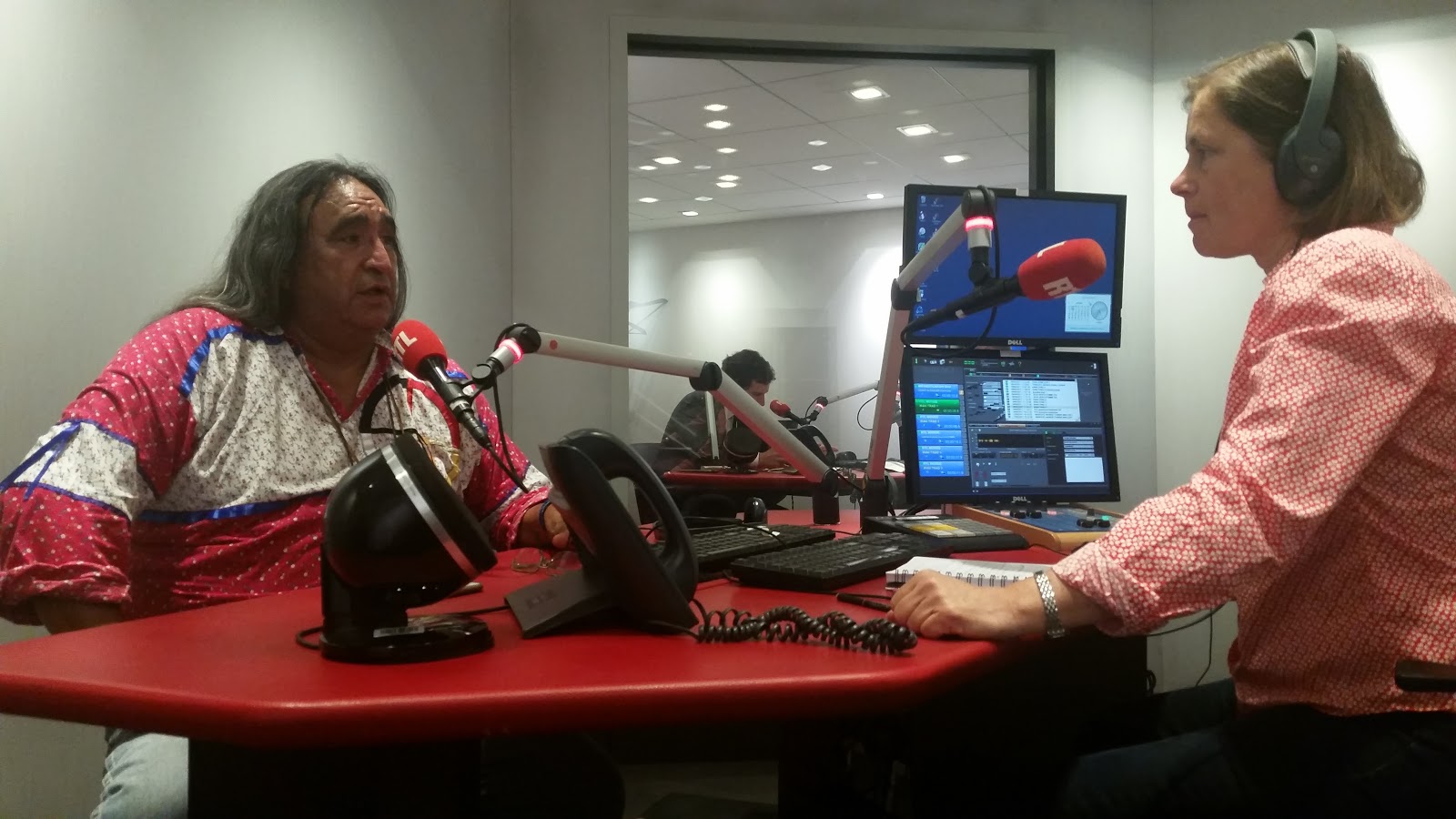
Juan Mancias and radio host with RTL, France’s largest radio station.
“I’m here to tell the banks the history of Texas and make sure that their due diligence is better. It’s one thing to talk to the companies, it’s another to also get the input from the people that live there. Just because the people from the bank will never go there doesn’t mean we don’t exist and it’s not affecting us.” - Juan Mancias, Carrizo Comecrudo Tribe of Texas
Sharing Our Stories to French Bank Executives
If LNG is built in the Rio Grande Valley, it’s another classic example of a disconnected Texas government, federal government, and now foreign financial investors forcing polluting industry on the will of small communities. Every single one of our coastal communities: South Padre Island, Port Isabel, Laguna Vista, Laguna Heights, and Long Island Village has taken a stand against LNG. These communities have either intervened on the company permit applications, passed a resolution opposing LNG, or both. Hundreds of interventions on the company permits have been sent to the federal government. Our local school district has refused to take financial benefits from Rio Grande LNG and Annova LNG. Even the local water district has taken a stand that they will deny all water requests water for LNG operations. Building LNG would destroy sacred indigenous sites and remains that the Carrizo Tribe has struggled to protect, and perpetuate environmental racism by dumping pollution into poor Latino communities for private profit. That’s exactly what we told the French banks. The Rio Grande Valley communities and our indigenous people have taken many measures to stop LNG and financing these projects would shatter their so-called ethics policies.
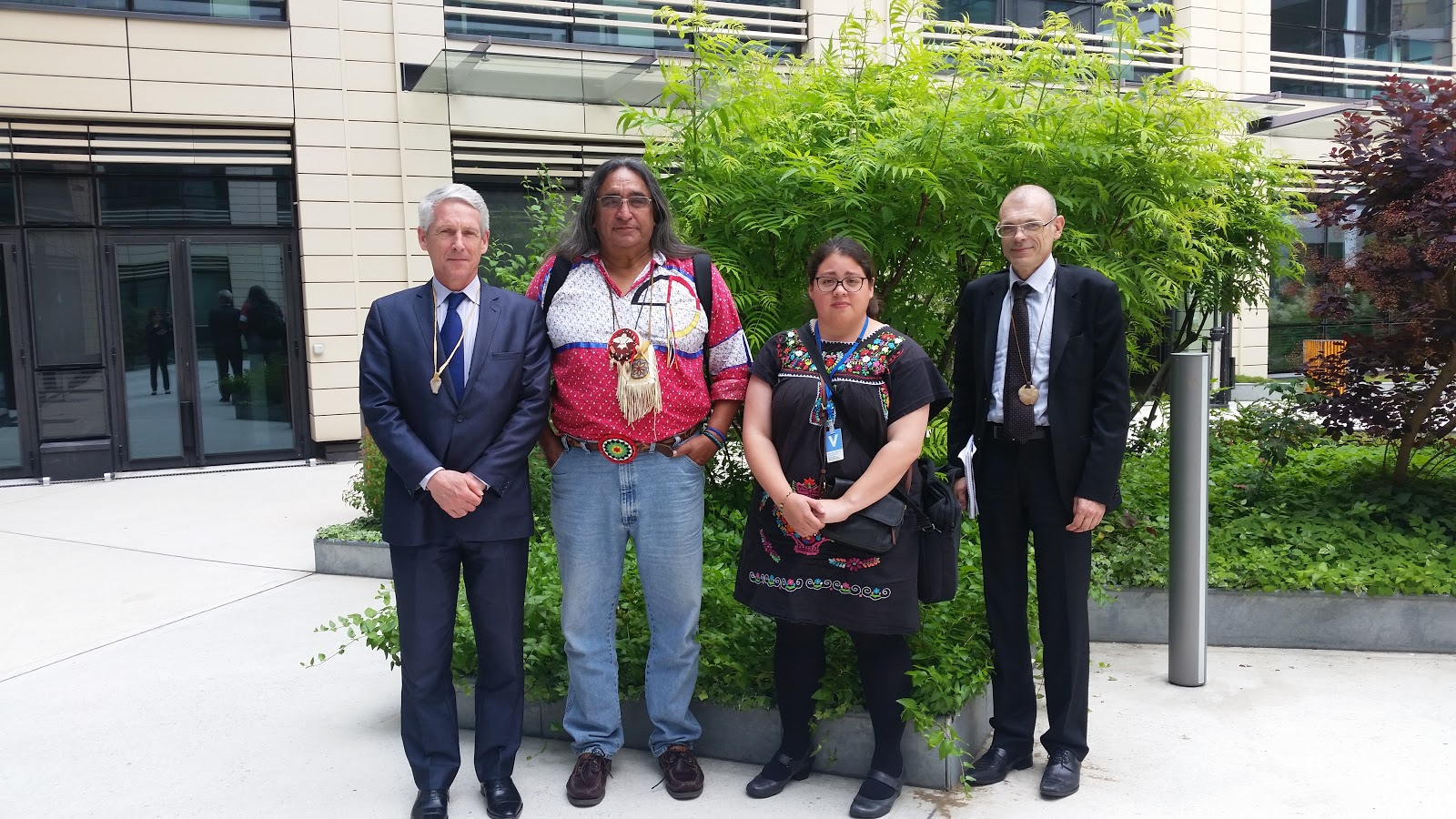
Meeting with Crédit Agricole, Sustainable Development Division representatives Jerome Courcier and Eric Cochard
While Crédit Agricole does not currently finance the three LNG export terminals or the pipelines, they do finance other fracking-related projects. We met with them to let them know of our resistance and advocated for those communities affected by fracking and its related project. Juan gave each executive a decorated pouch filled with sage, a custom from the Carrizo Tribe, to always offer a gift in return as a thank you.
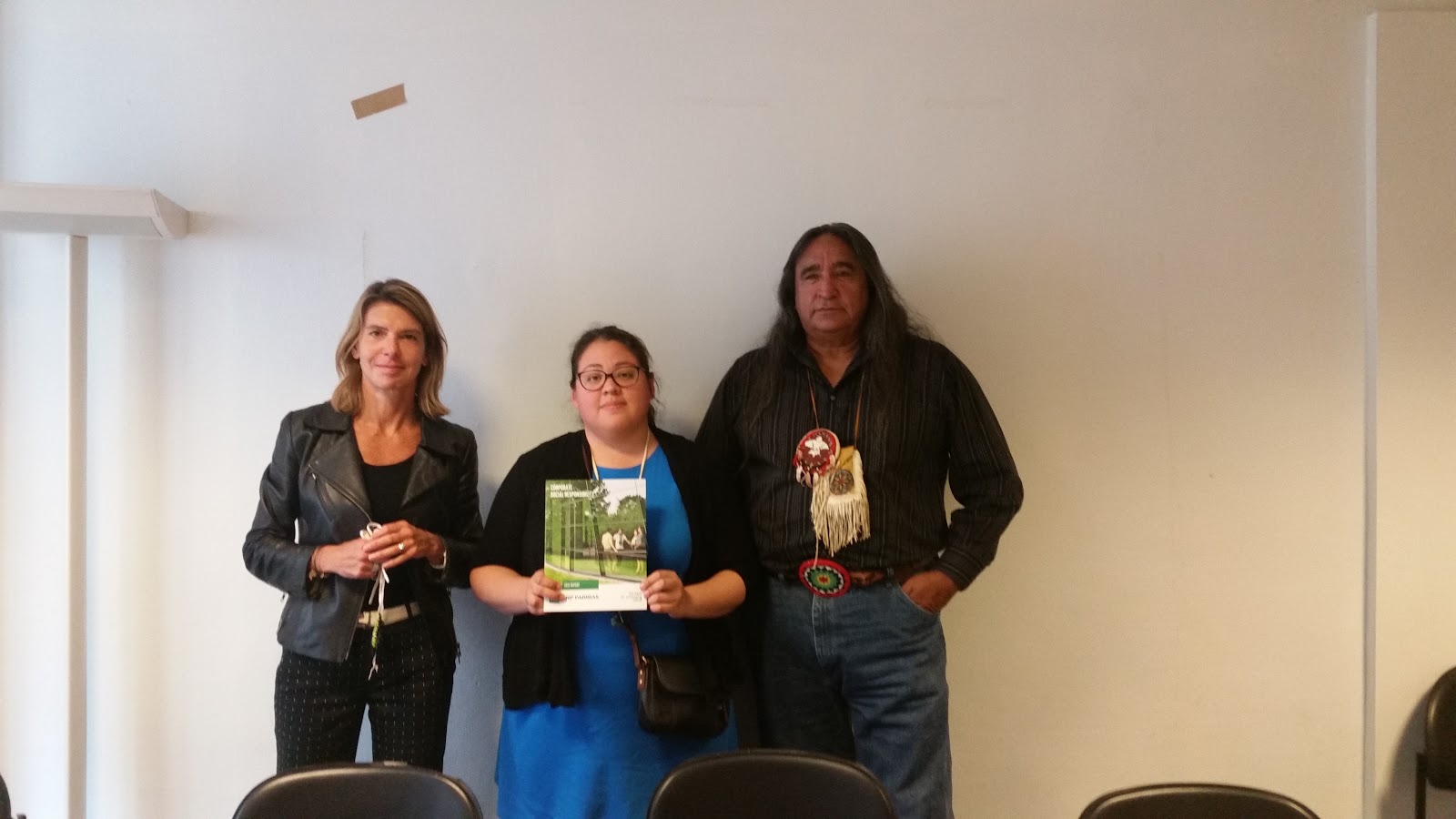
Meeting with BNP Paribas Head of Corporate Social Responsibility Laurence Pessez
BNP has lined up to finance the Texas LNG project, and they seemed to have no idea that this polluting facility would be built atop our indigenous sacred sites or in the center of an international wildlife corridor. At the end of the meeting, I grabbed a copy of the annual corporate social responsibility bank report and it had several photos of nature scenes and indigenous people living in Peru and India. If LNG is built, I hope BNP will include a photo of the terminal with black smoke spewing from the flare stacks, a common occurrence at other LNG terminals, next to our wetlands and homes. Because that is the reality of their business investments.
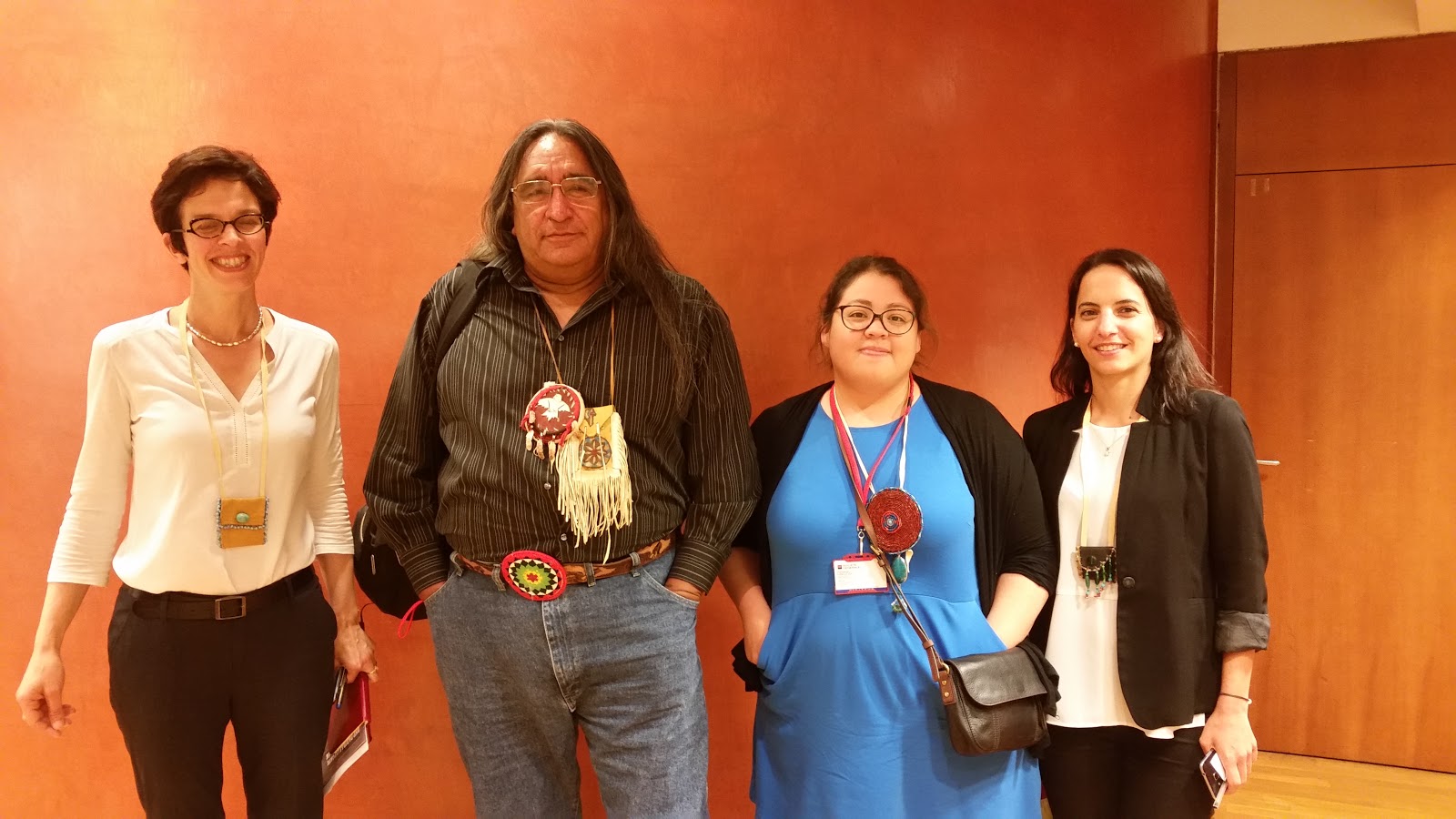
Meeting with Societe Generale representatives Cecile Rechatin, E&S Policies and Stakeholder Engagement Manager, Sylvie Prea Director of Corporate Social Responsibility, and Celine Houdin with Global Finance.
Societe Generale is the financial consultant for the NextDecade’s Rio Grande LNG terminal and the Rio Bravo Pipeline. We told them that our school district rejected NextDecade’s application for a handout and it was the first time that ever happened in Texas. They asked if the school had been consulted by the company. I told them James Markam-Hill, Communications Director for NextDecade, made a comment at the school meeting and his sales pitch did not sway their refusal for the application. Our communities have been consulted and they are not interested.
Attending the French Bank’s Annual Shareholders Meeting
For now, each bank has made no plans to publicly commit to divesting from the LNG projects and pipelines. So, we presented our stories to the bank shareholders meetings which conveniently all took place the same week in France. You should know that many French bank shareholders are not friendly (link in French) if you speak about the impacts the projects they finance are inflicting on communities. We all had the required tickets to enter, passed through security, dressed appropriately, and waited our turn to ask questions about the project during the allotted time of the meeting. And we were booed by the audience by Société Générale shareholders, assigned a security guard to sit next to each of us by Natixis, and supported with applause by BNP Paribas shareholders. A shareholder with Crédit Agricole referred to environmentalists as “polluters” of the shareholder meetings. At least we received a free tote bag from each bank, some bags containing a free bottle of wine or nice pens.
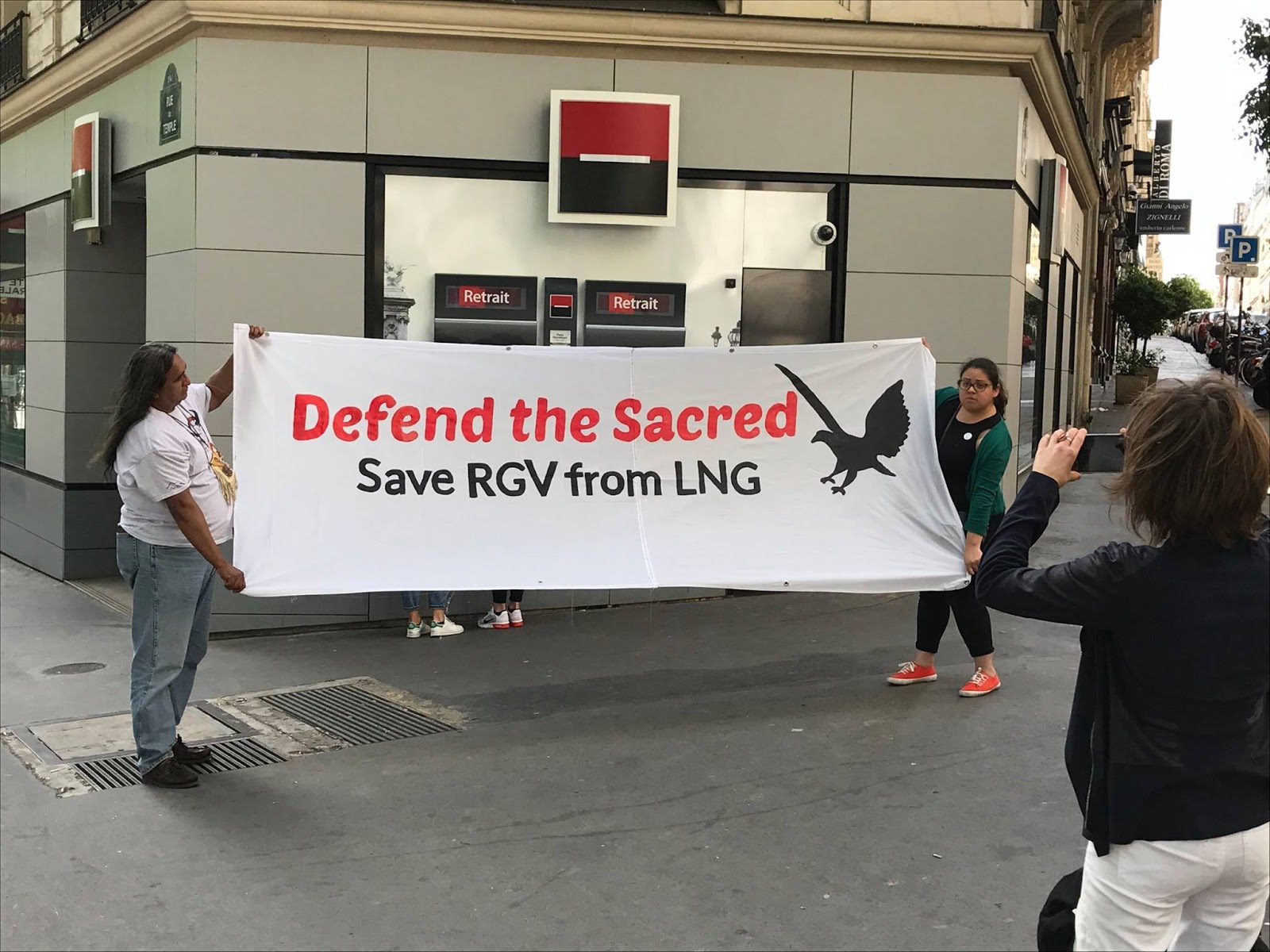
Rally outside a Société Générale Bank Office in Paris, France (read more)
We Met the French Government Too
Juan had the incredible opportunity to meet with two advisors to the new French President, Emmanuel Macron. He told them about indigenous rights ignored by the U.S. government and fossil fuel corporations and demanded French banks divest from all LNG projects. France successfully banned fracking in 2013, following a resistance from residents after they discovered the French government owned all the mineral rights underneath their homes. This fracking ban, however, did not prevent French banks to continue to profit off of fracking from other communities, especially ours in Texas. The Rio Grande Valley is being set-up to become a sacrifice zone for the largest LNG industrial complex in the world and it may be bankrolled by hypocritical French bank executives who sit comfortably in their homes free of any concern of fracking pollution. Juan sent this powerful message to his advisors and they agreed to pass it along to President Macron.
The Resistance Continues Back Home
So far, LNG is not a done deal. We expect about a year until the government can decide whether or not to grant the permits. I hope that our visit to France has sparked a new fire in the community organizers there to mobilize and stand with our people and demand banks divest. And for the banks, financing LNG cannot be done with a clear conscious, because we told them our truth: this will destroy the last clean coast in Texas and will pollute and irrevocably scar the Rio Grande Valley. Valley organizers will continue to pressure every phase of the regulatory process and we need your support to lead the fight. I’ll see you back in Texas at the next Save RGV from LNG community meeting.
Big thanks to organizers Lucie Pinson with Amis de la terre France (Friends of the Earth France), and Yann Louvel with BankTrack for hosting us and advocating for our community. Also, a very special thanks to the Rainforest Action Network (RAN).